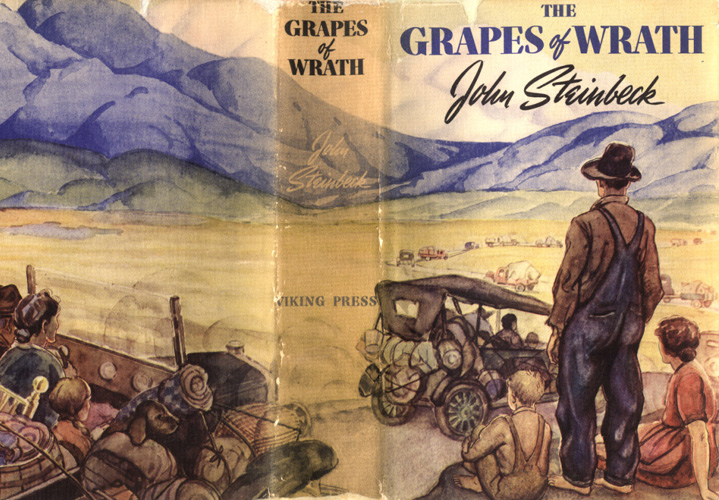Dear Student:
In preparation for your arrival at UCSC and your participation in the Rachel Carson College (formerly College Eight) core plenary and writing seminars, we have assigned two novels to be read during this summer: The Grapes of Wrath, by John Steinbeck (Penguin, 2002; paper) and Ecotopia, by Ernest Callenbach (Heyday, 2014). These books are on sale at UCSC’s Baytree Bookstore. Alternatively, you can order the books on-line, but please purchase these two editions; that will make it easier for you in your writing classes.
Why these two books? California and its people and environment, and their histories, play central roles in both. Because the Rachel Carson College (formerly College Eight) theme is “Environment and Society” and you are (or will be) living in California, these are especially pertinent. In the core course, we will be addressing geology, climate, geography, demography, labor, agriculture, water, biodiversity and the relationship of social justice to these topics. Many are addressed, in particular, in Grapes of Wrath and it is somewhat sobering to recognize that many of the problems that so troubled Steinbeck in the late 1930s continue to be of concern to California today.
How should you read the two novels? Carefully, of course. It does not hurt to take notes as you work your way through them (you will find notes useful in your core writing class). Pay close attention to writing in the books. Steinbeck was a master of the trade, Callenbach less so, but learning to write well—and we want you to be able to write well long before you graduate from UCSC—means looking carefully at how writers wield the English language, how they convey emotion, movement and setting, among other things, and how the rhythm of the words and sequences convey a certain tone and sensibility. Steinbeck uses colors frequently to paint textual pictures of both the Dust Bowl, from whence the Joad family flees, and California, to which they are migrating. In his portraits of characters, both major and minor, he is also quite detailed.






The Grapes of Wrath is both narrative and parable. It narrates the fictional journey of an Oklahoma family from their lost home in "Egypt," where they have been enslaved by financial interests, to the Promised Land of California (which is not quite what the migrants believe). Steinbeck draws heavily on both Old and New Testaments to structure his story. But he also mixes in “Red” (i.e., socialist) elements—red is a prominent color in the book—to suggest that the poor must organize, work together and establish a just society. In the core course plenary, these and other elements in the novel will be addressed, but try to identify as many of them as you are able.
Ecotopia is both a utopian novel of the future and the 1970s. It is also what is called a “traveler’s tale.” In such books, an individual is typically transported, either through travel or by some mysterious means (e.g., time travel), to another society in which many social problems have been addressed (of course, sometimes the travelers end up in dystopias, where things are worse). In the text, the traveler describes and reflects on the new society and compares it to the one from which s/he came. Utopias are never about possible futures; they are always about the time and place in which the author is writing. Ernest Callenbach wrote this book in the early 1970s, and much of what he sees in Ecotopia is more about the California in which he lived than about an ecological secession from the United States. Of course, this is 2016, but try to decide whether Callenbach was accurate in his extrapolation of various trends from the 1960s and 1970s (see, for example, his description of newspapers on demand on Market Street in San Francisco).
You can find more resources on the novels here:
If you are interested, you can also watch videos from the November 2015 "Utopian Dreaming" conference, organized by Rachel Carson College (formerly College Eight). Several of the speakers addressed Ecotopia.
While we don’t expect you to read these books more than once—and you must read them all the way through at least once—both bear rereading several times. We know this is your first summer following high school graduation. It’s a good time to have a good time, but put aside a few hours a day to read the books.
All the best,

Ronnie Lipschutz
Provost, Rachel Carson College (formerly College Eight)
